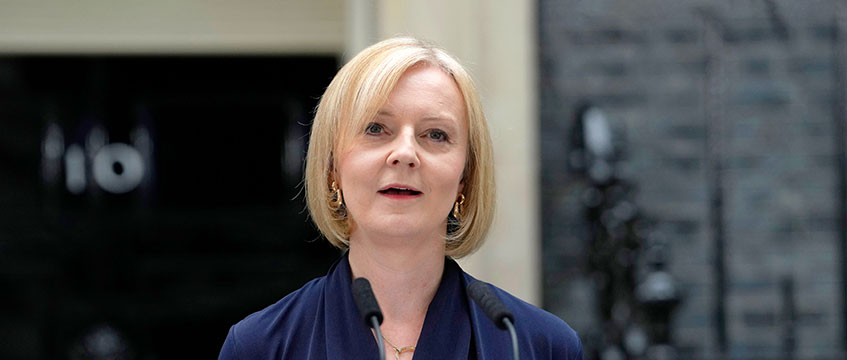Industry reacts as Truss resigns as prime minister
Liz Truss has quit as prime minister after just 45 days in the role.
Speaking outside 10 Downing Street today, she announced that an election for the leadership of the Conservative Party will be held next week. Truss will remain as prime minister until a successor is picked.
Her time in the premiership has been dominated by turmoil in the financial markets following last month’s mini-Budget, headed up by former chancellor Kwasi Kwarteng. The economic plan was a core part of her leadership bid.
Liz Truss has quit as prime minister after just 45 days in the role.
Speaking outside 10 Downing Street today, she announced that an election for the leadership of the Conservative Party will be held next week. Truss will remain as prime minister until a successor is picked.
Her time in the premiership has been dominated by turmoil in the financial markets following last month’s mini-Budget, headed up by former chancellor Kwasi Kwarteng. The economic plan was a core part of her leadership bid.
Earlier this week, new chancellor Jeremy Hunt set out a plan reversing many of the tax cuts that were previously set out. However, real estate continues to face uncertainty on various policies and commitments including investment zones, business rates and bids for levelling up grants on the back of inflation.
Industry figures have so far urged the government not to lose sight of those issues, as well as the ongoing lack of affordable housing. Some have also expressed their hopes that the market will stabilise after her exit.
James Blakey, planning director at Moda Living, said: “The politics of recent weeks has been extraordinary, but let’s remain optimistic that we can draw a line under it and move forwards. The UK is in desperate need of a stable government and a prime minister who will focus proactively on addressing the housing crisis which is impacting on so many lives.”
Jenna Harris, head of co-living at Harris Associates, said: “The resignation [of] Liz Truss as prime minister will hopefully be followed by a reputable replacement; this should result in a new confidence in the market. Already the pound has signified a bounce-back alongside strengthening market indications. Even though this is just the beginning of a new path for the economy, investment transactions should become more stable.”
Jamie Harris, head of student accommodation – capital markets, also at Harris Associates, said: “The exit of Liz Truss will likely restore a sense of calm in the markets, following a period of substantial volatility. The new prime minister will need to assert strong fiscal discipline to re-assure nervous investors that the UK is committed to reducing inflation and borrowing – working in tandem with the Bank of England. This should then result in lower interest rate rise expectations, likely causing less aggressive yield expansion expectations.
“Investors are looking forward to less volatility, allowing funds to be able to accurately price different asset classes, even at wider yields. The issue with the environment under Liz Truss, was a lack of clarity both on values and the direction of travel which we hope will clear.”
Darren Zitren, head of network estate management at Cluttons, said: “We are mindful that the government has focused most attention on energy bills and the cost of living in this emergency business response and mini-Budget and, while this is understandable, the foot cannot be taken off the gas of measures that will accelerate growth and support economic recovery to the whole of the UK in the months and years ahead.”
Zitren added: “The UK cannot afford to abandon levelling up, no matter what it is called or how it is presented. Connectivity is key to levelling up the UK because this fuels economic growth, investment from businesses, talent, jobs and access to social benefits and healthcare, among many other things, including access to energy infrastructure, which is going to be ever more crucial going forward. Hence, we hope that the rollout of super-fast broadband and 5G infrastructure gets a higher pegging on the list of levelling-up priorities than the previous administration’s watering down of targets.”
Ryan Jones, partner in rating, also at Cluttons, said: “Business rates need to be looked at again and in depth. Over the past three years, businesses have faced many challenges, from Brexit and Covid to the acceleration of online retail and, latterly, the energy and talent crisis – the latter two causing many retail and hospitality businesses in particular to close part-time in a bid to save on costs or because they cannot operate.
“Many other businesses have adapted and sought to be innovative to cope with these changes. Now is the time to help them flourish and enjoy a prolonged period of operation during a time when the British public are embracing physical retail and getting to grips with the return to the office. We believe smaller businesses should take priority, but we must also not forget the pension funds and public sector bodies that also own and occupy real estate, and who have a duty to ensure that finances are protected to support real people in the long term.”
To send feedback, e-mail pui-guan.man@eg.co.uk or tweet @PuiGuanM or @EGPropertyNews
Photo © Kirsty Wigglesworth/AP/Shutterstock











